
Diwali is the Hindu festival of lights, with variations celebrated in other Indian religions. It symbolises the spiritual "victory of light over darkness, good over evil, and knowledge over ignorance". Diwali is celebrated during the Hindu lunisolar months of Ashvin and Kartika—between around mid-September and mid-November. The celebrations generally last five or six days.

Puja, also spelt pooja, is a worship ritual performed by Hindus to offer devotional homage and prayer to one or more deities, to host and honour a guest, or to spiritually celebrate an event. It may honour or celebrate the presence of special guests, or their memories after they die. The word puja is roughly translated into English as 'reverence, honour, homage, adoration, or worship'. Puja, the loving offering of light, flowers, and water or food to the divine, is the essential ritual of Hinduism. For the worshipper, the divine is visible in the image, and the divinity sees the worshipper. The interaction between human and deity, between human and guru, is called a Darshanam.

Jagannatha is a deity worshipped in regional Hindu traditions in India as part of a triad along with his (Krishna's) brother Balabhadra, and sister, Subhadra. Jagannath, within Odia Hinduism, is the supreme god, Purushottama, and the Para Brahman. To most Vaishnava Hindus, particularly the Krishnaites, Jagannath is an abstract representation of Krishna, sometimes as the avatar of Vishnu.
Prana pratishtha is the rite or ceremony by which a murti is consecrated in a Hindu temple, wherein hymns and mantra are recited to invite the deity to be resident guest, and the murti's eye is opened for the first time. Practised in the temples of Hinduism and Jainism, the ritual is considered to infuse life into the Hindu temple, and bring to it the numinous presence of divinity and spirituality.
A shikharbaddha mandir is a traditional Hindu or Jain place of worship, typically featuring architecture characterized by superstructures with towers pinnacles and domes and often built of carved marble, sandstone, or other stone. While such mandirs are common in many branches of Hinduism, the use of the term shikharbaddha mandir to describe such mandirs is most common in the Swaminarayan branch of Hinduism as well as Jainism. The opposite of the shikharbaddha temple is one without a shikhara tower, i.e. with a flat roof.
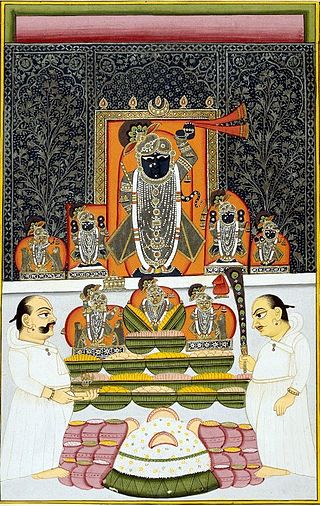
Govardhan Puja, also known as Annakut or Annakoot, is a Hindu festival celebrated on the first lunar day of the bright fortnight of the month of Kartika, on the fourth day of Diwali. Devotees worship Govardhan Hill and prepare and offer a large variety of vegetarian food to Krishna as a mark of gratitude. For Vaishnavas, this day commemorates the incident in the Bhagavata Purana when Krishna lifted Govardhan Hill to provide the villagers of Vrindavan shelter from torrential rains. This incident symbolizes God offering protection to devotees who take singular refuge in him. Devotees offer a mountain of food, metaphorically representing the Govardhan Hill, to God as a ritual remembrance and to renew their faith in taking refuge in God. The festival is observed by most Hindu denominations all over India and abroad.
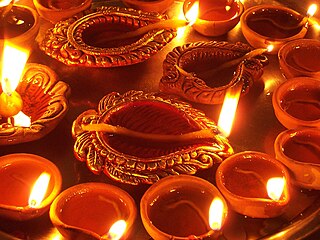
Worship in Hinduism is an act of religious devotion usually directed to one or more Hindu deities, invoking a sense of Bhakti or devotional love. This term is probably a central one in Hinduism, but a direct translation from the Sanskrit to English is difficult. Worship in Hinduism takes many forms, and its expression vary depending on geographical, linguistic, and cultural factors. Hindu worship is not limited to a particular place and Hindus perform worship in temples and within the home. It often incorporates personal reflection, music, dance, poetry, rituals, and ceremonies. Worship in Hinduism serves various purposes, including seeking blessings, guidance, or specific outcomes, as well as fostering a sense of inner peace and spiritual growth. It can also be an expression of devotion (bhakti) to the deity. The aim is to lead a pure life in order to progress spiritually and eventually attain liberation (moksha) from the cycle of rebirth.
New Delhi Kali Bari is a Hindu temple dedicated to Goddess Kali and the center for Bengali culture in New Delhi, India. Established in 1930s, it is situated on Mandir Marg, close to Laxminarayan Temple in Delhi.

ISKCON Temple Chennai, also known as the Sri Sri Radha Krishna Mandir, is a Gaudiya Vaishnavism temple in Chennai, India. The temple is dedicated to Supreme Lord Krishna and His divine consort Radha. It was formally inaugurated on 26 April 2012.
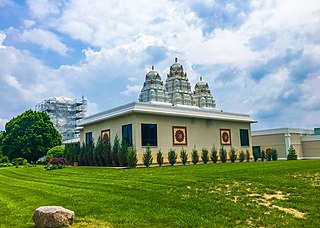
The Hindu Temple of Dayton is a Hindu temple in Beavercreek, Ohio. It opened in 1984, making it the oldest Hindu temple in the Dayton metropolitan area. It has shrines for the deities Venkateshwara, Rama and Sita, Lakshmana and Hanuman, Ganesha, and Radha Krishna.
The Hindu Mandir of Lake County (HMLC) is a non-profit Hindu temple situated in Grayslake, Illinois. The Hindu Mandir of Lake County was originally established in 2004.

The BAPS Hindu Mandir Abu Dhabi in the UAE, is a traditional Hindu mandir built by the BAPS Swaminarayan Sanstha. Inspired by Pramukh Swami Maharaj (1921–2016) and consecrated by Mahant Swami Maharaj on 14 February 2024, this is the first traditional Hindu mandir in Abu Dhabi.
Ved Prakash Nanda was an Indian-American academic who received the Padma Bhushan award on 20 March 2018 in the field of literature and education.

The Hindu Temple of Central Indiana is a Hindu temple in Indianapolis, Indiana. Opened in 2006, it is the oldest Hindu temple in Indiana. Local public TV station WFYI has called it "a breathtaking new monument - impressive in both scope and design, as well as a testament to the growing multiculturalism of the region." The Indianapolis Star says it is "an iconic structure that pays homage to various holy shrines across India."
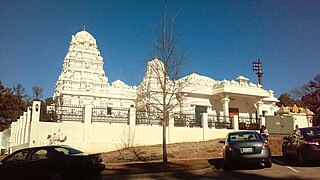
Sri Venkateswara Temple of North Carolina is a Hindu Temple located in Cary, North Carolina and serves the estimated 21,000 Hindus in the Research Triangle area. The temple is "dedicated to promoting the Hindu religion and humanitarian services across the Triangle."

The Ram Mandir is a partially constructed Hindu temple complex in Ayodhya, Uttar Pradesh, India. Many Hindus believe that it is located at the site of Ram Janmabhoomi, the mythical birthplace of Rama, a principal deity of Hinduism. The temple was inaugurated on 22 January 2024 after a prana pratishtha (consecration) ceremony. On the first day of its opening, following the consecration, the temple received a rush of over half a million visitors, and after a month, the average number of visitors was reported to be "1 to 1.5 lakh on a daily basis".
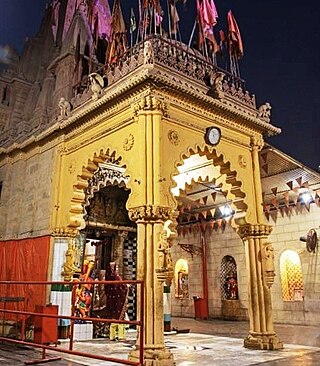
The Panchmukhi Hanuman Mandir is a historic Hindu mandir in Karachi, Pakistan The mandir was declared as a national heritage under the Sindh Cultural Heritage (Preservation) Act 1994 and is believed to be at least 1,500 years old.

Bharatiya Mandir is a Hindu Temple in the Auckland suburb of Sandringham. It is the oldest and first purpose-built temple in New Zealand and officially opened in June 1993.
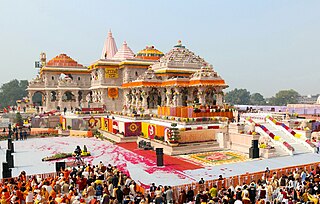
The Prana pratishtha (consecration) ceremony of the Ram Mandir was held on 22 January 2024, in a traditional sacred ceremony, wherein priests recited mantras invoking the God Rama. The Prana Pratishtha ceremony, that is considered to bring a presence of divinity, is an essential ritual before the inauguration of a Hindu temple. The ceremony involved the pran pratishtha of the primary temple deity, Ram Lalla, also known as Balak Ram, and subsequent opening of the temple for visitors.














